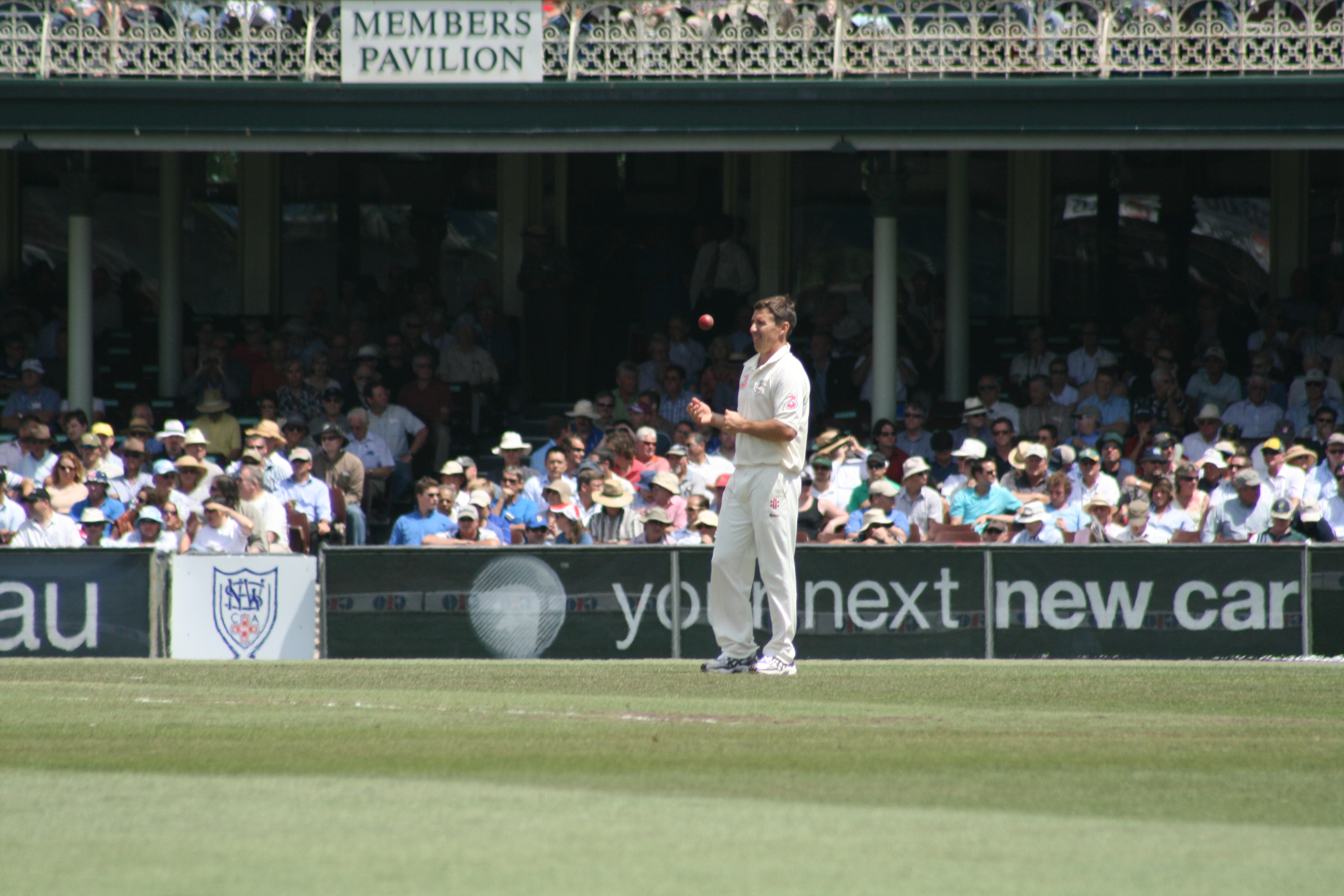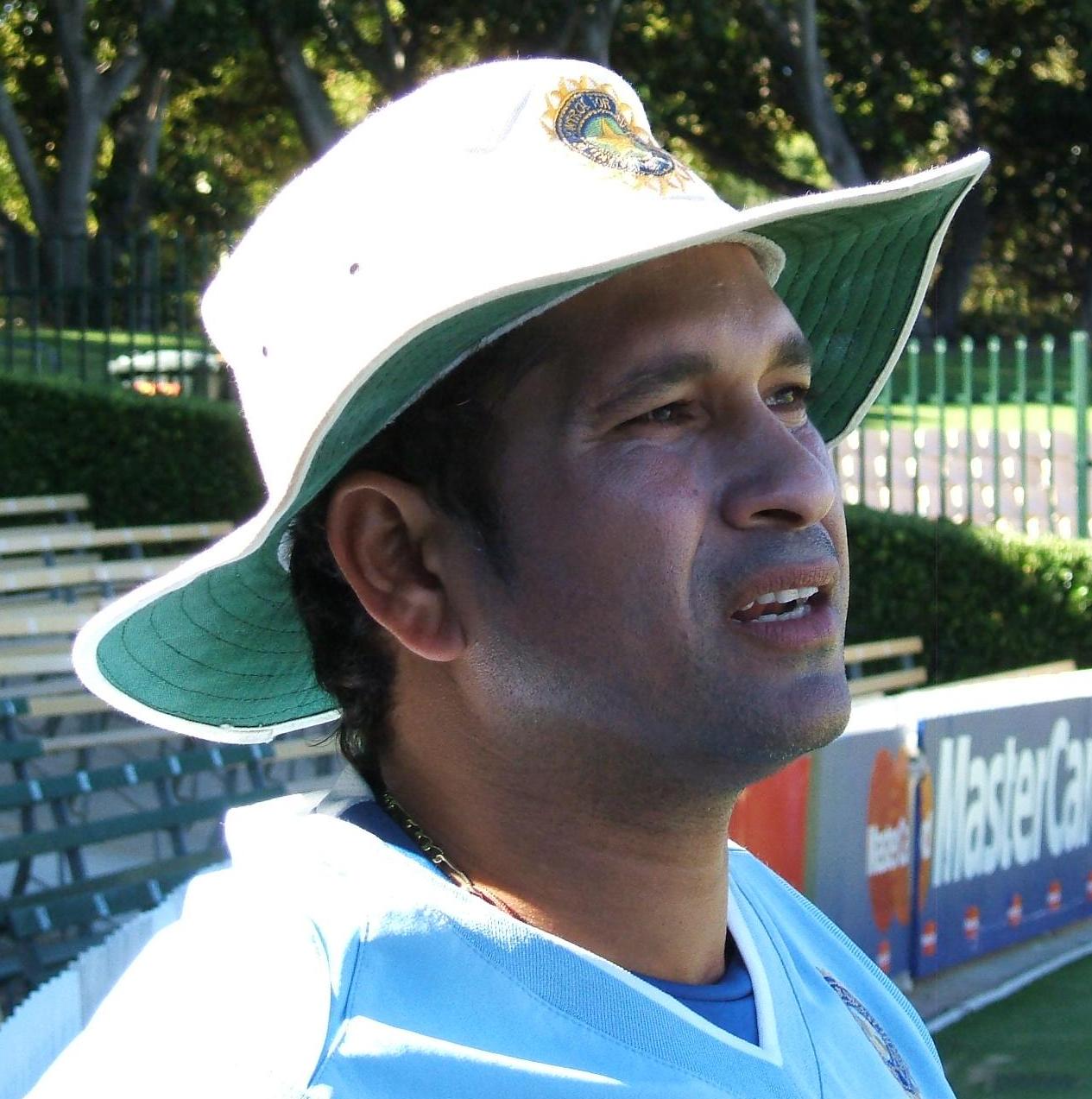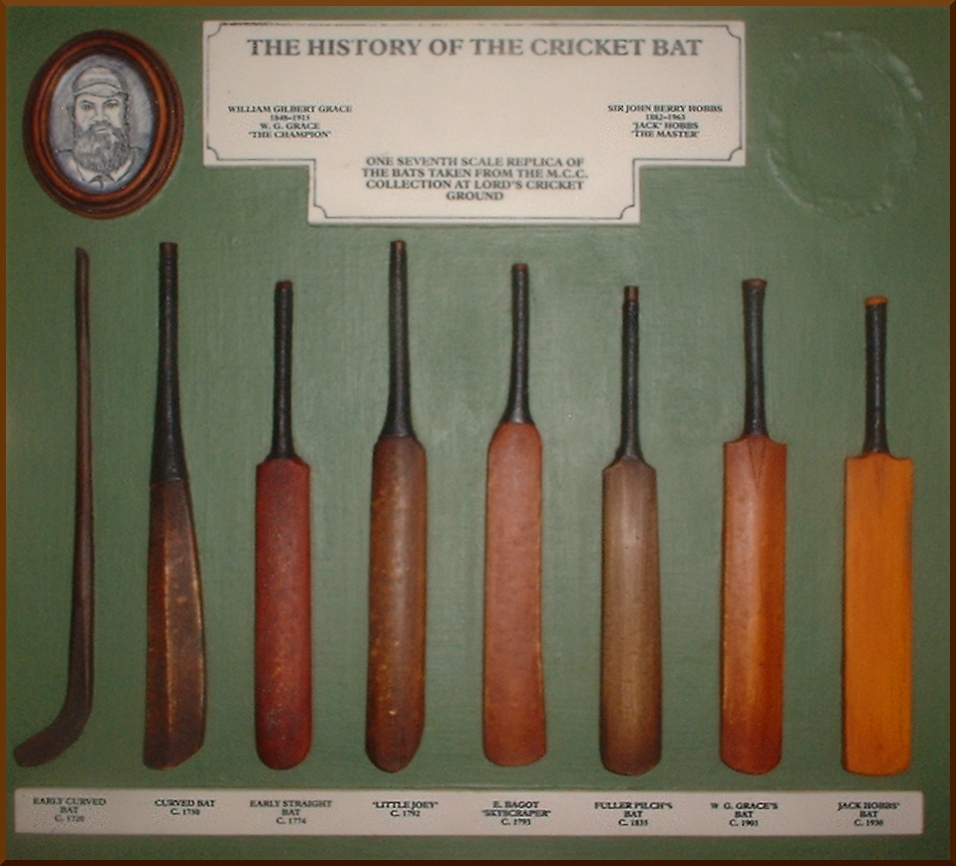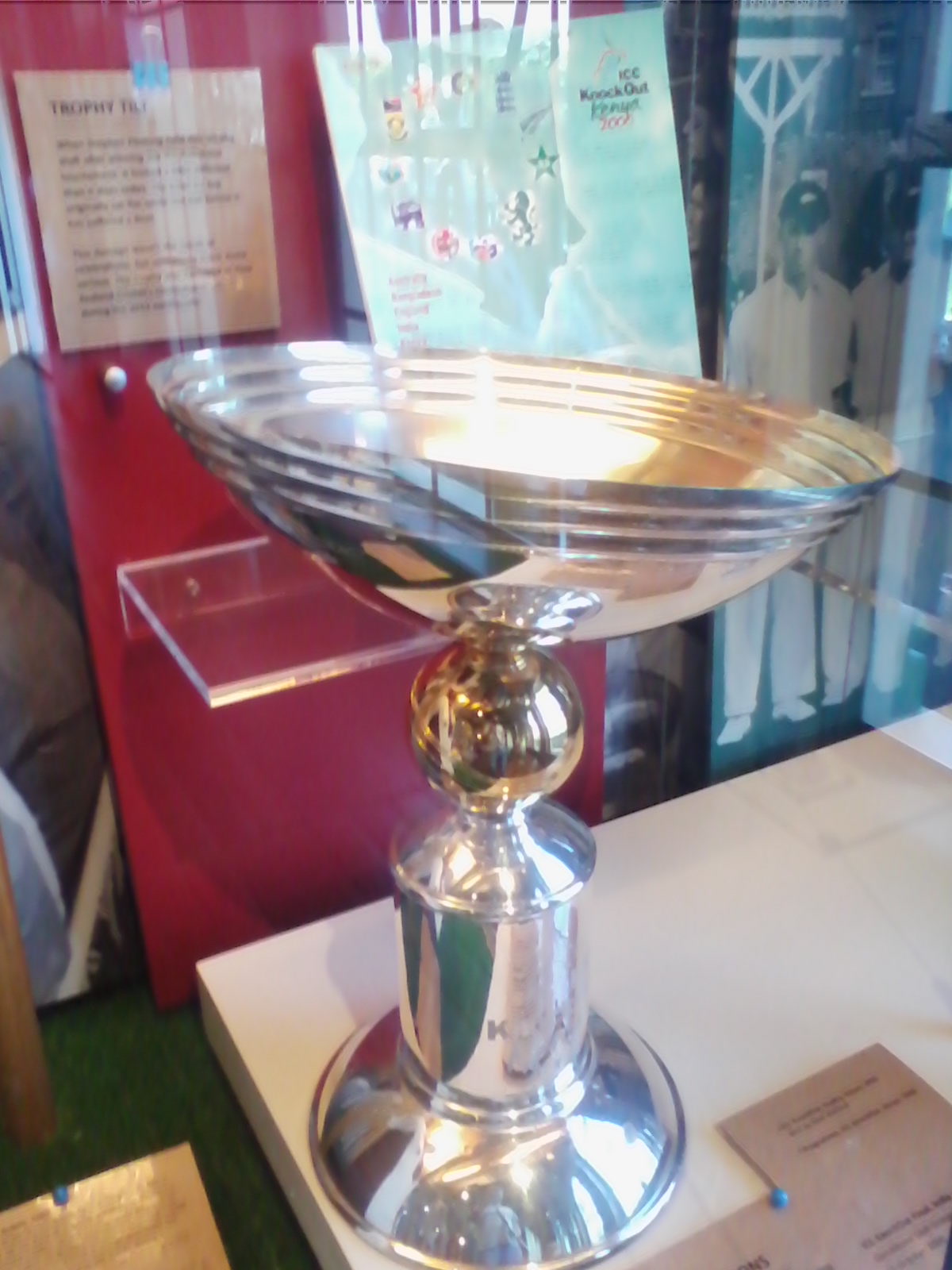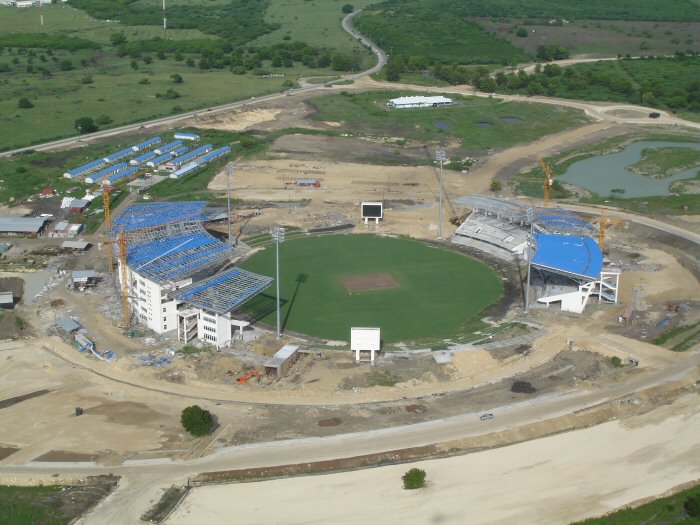|
Brad Hogg
George Bradley Hogg (born 6 February 1971) is a former Australian cricketer who played all formats of the game. He was a left-arm Left-arm unorthodox spin, wrist spin Bowler (cricket), bowler, and a lower-order left-handed batsman. His earlier international career was revitalised by Shane Warne's absence from cricket in 2003 due to suspension (punishment), suspension from a drugs test and subsequent retirement from one-day cricket. He is Australia's eleventh most successful One Day International bowler and third most successful spinner in terms of wickets taken. He retired from International cricket on 4 March 2008 after the 2007–08 Commonwealth Bank Series. With his time representing Australia, Hogg won multiple ICC titles with the team: the 2003 Cricket World Cup, the 2007 Cricket World Cup, and the 2006 ICC Champions Trophy. In a surprise comeback to the Twenty20 (T20) format at the inaugural Big Bash League in 2011, Hogg became a cult hero of the short form, bringing abo ... [...More Info...] [...Related Items...] OR: [Wikipedia] [Google] [Baidu] [Amazon] |
Brad Hodge
Bradley John Hodge (born 29 December 1974) is an Australian cricket coach and former cricketer. He was a right-handed batsman who batted in the middle order, as well as a part-time right-arm off-spin bowler. Hodge was a member of the Australian team that won the 2007 Cricket World Cup. Hodge was a prolific run-scorer in domestic cricket, holding the records for the most runs (5,597) and most centuries (20) in Australian interstate one-day matches. He is also Victoria's highest ever run-scorer in the Sheffield Shield (10,474 runs). However, his opportunities to represent Australia were limited to 6 Tests, 25 one-day internationals (ODIs) and 15 T20 Internationals. First-class career Hodge attended St. Bede's College in Mentone, Victoria. He debuted for the Victorian Bushrangers as a 19-year-old, and was nicknamed "Bunkie" by Dean Jones for the fact that he shared a bunkbed with his brother at the time of his debut. Hodge played Lancashire League Cricket for Ramsbott ... [...More Info...] [...Related Items...] OR: [Wikipedia] [Google] [Baidu] [Amazon] |
First-class Cricket
First-class cricket, along with List A cricket and Twenty20 cricket, is one of the highest-standard forms of cricket. A first-class match is of three or more days scheduled duration between two sides of eleven players each and is officially adjudged to be worthy of the status by virtue of the standard of the competing teams. Matches must allow for the teams to play two innings each, although in practice a team might play only one innings or none at all. The etymology of "first-class cricket" is unknown, but the term was used loosely before it acquired official status in 1895, following a meeting of leading English clubs. At a meeting of the International Cricket Council, Imperial Cricket Conference (ICC) in 1947, it was formally defined on a global basis. A significant omission of the ICC ruling was any attempt to define first-class cricket retrospectively. That has left historians and statisticians with the problem of how to categorise earlier matches, especially those played in ... [...More Info...] [...Related Items...] OR: [Wikipedia] [Google] [Baidu] [Amazon] |
Batsman
In cricket, batting is the act or skill of hitting the cricket ball, ball with a cricket bat, bat to score runs (cricket), runs and prevent the dismissal (cricket), loss of one's wicket. Any player who is currently batting is, since September 2021, officially referred to as a batter regardless of whether batting is their particular area of expertise. Historically, ''batsman'' and ''batswoman'' were used, and these terms remain in widespread use. Batters have to adapt to various conditions when playing on different cricket pitches, especially in different countries; therefore, as well as having outstanding physical batting skills, top-level batters will have quick reflexes, excellent decision-making skills, and be good strategists. During an innings two members of the batting side are on the pitch at any time: the one facing the current delivery from the bowler is called the striker, while the other is the non-striker. When a batter is dismissal (cricket), out, they are replac ... [...More Info...] [...Related Items...] OR: [Wikipedia] [Google] [Baidu] [Amazon] |
Bowler (cricket)
Bowling, in cricket, is the action of throwing, propelling the cricket ball, ball toward the wicket defended by a batter. A player skilled at bowling is called a ''bowler''; a bowler who is also a competent :Batting (cricket), batter is known as an all-rounder. Bowling the ball is distinguished from throwing (cricket), ''throwing'' the ball by a strictly specified biomechanical definition, which restricts the angle of extension of the elbow. A single act of bowling the ball towards the batter is called a ''ball'' or a ''delivery (cricket), delivery''. Bowlers bowl deliveries in sets of six, called an ''over (cricket), over''. Once a bowler has bowled an over, a teammate will bowl an over from the other end of the pitch. The Laws of Cricket govern how a ball must be bowled. If a ball is bowled illegally, an umpire (cricket), umpire will rule it a ''no-ball''. If a ball is bowled too wide of the striker for the batter to be able to play at it with a proper cricket shot, the bowler' ... [...More Info...] [...Related Items...] OR: [Wikipedia] [Google] [Baidu] [Amazon] |
Cricket
Cricket is a Bat-and-ball games, bat-and-ball game played between two Sports team, teams of eleven players on a cricket field, field, at the centre of which is a cricket pitch, pitch with a wicket at each end, each comprising two Bail (cricket), bails (small sticks) balanced on three stump (cricket), stumps. Two players from the Batting (cricket), batting team, the striker and nonstriker, stand in front of either wicket holding Cricket bat, bats, while one player from the Fielding (cricket), fielding team, the bowler, Bowling (cricket), bowls the Cricket ball, ball toward the striker's wicket from the opposite end of the pitch. The striker's goal is to hit the bowled ball with the bat and then switch places with the nonstriker, with the batting team scoring one Run (cricket), run for each of these swaps. Runs are also scored when the ball reaches the Boundary (cricket), boundary of the field or when the ball is bowled Illegal delivery (cricket), illegally. The fielding tea ... [...More Info...] [...Related Items...] OR: [Wikipedia] [Google] [Baidu] [Amazon] |
Cricket At The 1998 Commonwealth Games
Cricket was included in the 1998 Commonwealth Games in Malaysia. This was the only time cricket was played at a Commonwealth Games until a women's tournament was included in the 2022 Commonwealth Games. Matches were played over 50 overs, and had List A status rather than full One Day Internationals. As is normal at the multisports events, the Caribbean islands that entered participated as separate nations, not as the combined West Indies team. Indeed, the Games were the first occasion on which an Antigua and Barbuda side competed at a senior level. Northern Ireland also entered, this occurrence being noteworthy because Irish cricket is usually represented by an all-island Irish cricket team. Sixteen teams entered the competition, including seven of the nine then Test-playing nations: West Indies did not enter as mentioned above, while England declined to send a team at all, on the grounds that the September date chosen clashed with other fixtures such as the end of the County ... [...More Info...] [...Related Items...] OR: [Wikipedia] [Google] [Baidu] [Amazon] |
Commonwealth Games
The Commonwealth Games is a quadrennial international multi-sport event among athletes from the Commonwealth of Nations, which consists mostly, but not exclusively, of territories of the former British Empire. The event was first held in 1930 British Empire Games, 1930 as the British Empire Games and, with the exception of 1942 and 1946 (which were cancelled due to World War II), has successively run every four years since. The event was called the British Empire Games from 1930 to 1950 British Empire Games, 1950 (four editions), the British Empire and Commonwealth Games from 1954 British Empire and Commonwealth Games, 1954 to 1966 British Empire and Commonwealth Games, 1966 (four editions), and the British Commonwealth Games from 1970 British Commonwealth Games, 1970 to 1974 British Commonwealth Games, 1974 (two editions). The event removed the word ''British'' from its title for the 1978 Commonwealth Games, 1978 Games and has maintained its current name ever since (twelve edi ... [...More Info...] [...Related Items...] OR: [Wikipedia] [Google] [Baidu] [Amazon] |
2006 ICC Champions Trophy
The 2006 ICC Champions Trophy was a One Day International cricket tournament held in India from 7 October to 5 November 2006. It was the fifth edition of the ICC Champions Trophy (previously known as the ICC Knock-out). The tournament venue was not confirmed until mid-2005 when the Indian government agreed that tournament revenues would be free from tax (the 2002 tournament had been due to be held in India, but was switched to Sri Lanka when an exemption from tax in India was not granted). Australia won the tournament, their first Champions Trophy victory. They were the only team to get one loss in the tournament, as all other teams lost at least two matches. West Indies, their final opponents, beat Australia in the group stage but were bowled out for 138 in the final and lost by eight wickets on the Duckworth–Lewis method. West Indies opening batsman Chris Gayle was named Player of the Tournament. English writer Tim de Lisle said the tournament "had been fun" because "it h ... [...More Info...] [...Related Items...] OR: [Wikipedia] [Google] [Baidu] [Amazon] |
ICC Champions Trophy
The ICC Champions Trophy, formerly known as the ICC Knock Out Trophy, is an international One Day International (ODI) cricket tournament organised by the International Cricket Council (ICC) contested by international men's teams. Inaugurated in 1998, the ICC conceived the idea of the Champions Trophy – a short cricket tournament to raise funds for the development of the game in non-test playing countries. The first Champions Trophy was organised in Bangladesh in June 1998, with the Cricket World Cup having had existed for 23 years with six completed editions. The first two Champions Trophies were held in ICC Associate member nations – Bangladesh and Kenya, to increase the popularity of the sport in those countries and then use the funds collected for the development of their cricket. From the 2002 tournament onwards, hosting has been shared between countries under an unofficial rotation system, with six ICC members having hosted at least one match in the tournament. T ... [...More Info...] [...Related Items...] OR: [Wikipedia] [Google] [Baidu] [Amazon] |
2007 Cricket World Cup
The 2007 ICC Cricket World Cup was the ninth Cricket World Cup, a One Day International (ODI) cricket tournament that took place in the West Indies from 13 March to 28 April 2007. There were a total of 51 matches played, three fewer than at the 2003 ICC Cricket World Cup, 2003 World Cup (despite a field larger by two teams). The 16 competing teams were initially divided into four groups, with the two best-performing teams from each group moving on to a Super 8 format. Every team played a total of 6 matches in the Super 8 round; they didn't play with teams of their own group. They played a total of 6 teams from another three groups (the top 2 teams of all three groups) From this, Australia national cricket team, Australia, New Zealand national cricket team, New Zealand, Sri Lanka national cricket team, Sri Lanka, and South Africa national cricket team, South Africa won through to the semi-finals, with Australia defeating Sri Lanka in the final to win their third consecutive World C ... [...More Info...] [...Related Items...] OR: [Wikipedia] [Google] [Baidu] [Amazon] |
2003 Cricket World Cup
The 2003 ICC Cricket World Cup was the eighth Cricket World Cup, organised by the International Cricket Council (ICC). It was co-hosted by South Africa, Zimbabwe and Kenya from 9 February to 23 March 2003. This edition of the World Cup was the first to be played in Africa. The tournament featured 14 teams, the largest number in the World Cup's history at the time, playing a total of 54 matches. It followed the format introduced in the 1999 Cricket World Cup, with the teams divided into two groups, and the top three in each group qualifying for the Super Sixes stage. The tournament saw numerous upsets, with South Africa, Pakistan, West Indies and England all being eliminated at the group stage (South Africa missed by 1 run after misreading the Duckworth-Lewis method rules). England forfeited their match with Zimbabwe, due to the political unrest in the country, which ultimately enabled that team to reach the Super Sixes. Similarly, New Zealand forfeited their match with Kenya, ... [...More Info...] [...Related Items...] OR: [Wikipedia] [Google] [Baidu] [Amazon] |
ICC Cricket World Cup
The ICC Men's Cricket World Cup is a quadrennial world cup for cricket in One Day International (ODI) format, organised by the International Cricket Council (ICC). The tournament is one of the world's most viewed sporting events and considered the flagship event of the international cricket calendar by the ICC. The first Cricket World Cup was organised in England in June 1975, with the first ODI cricket match having been played only four years earlier. However, a separate Women's Cricket World Cup had been held two years before the first men's tournament, and a tournament involving multiple international teams had been held as early as 1912, when a triangular tournament of Test matches was played between Australia, England and South Africa. The first three World Cups were held in England. From the 1987 tournament onwards, hosting has been shared between countries under an unofficial rotation system, with 14 ICC members having hosted at least one match in the tourname ... [...More Info...] [...Related Items...] OR: [Wikipedia] [Google] [Baidu] [Amazon] |
